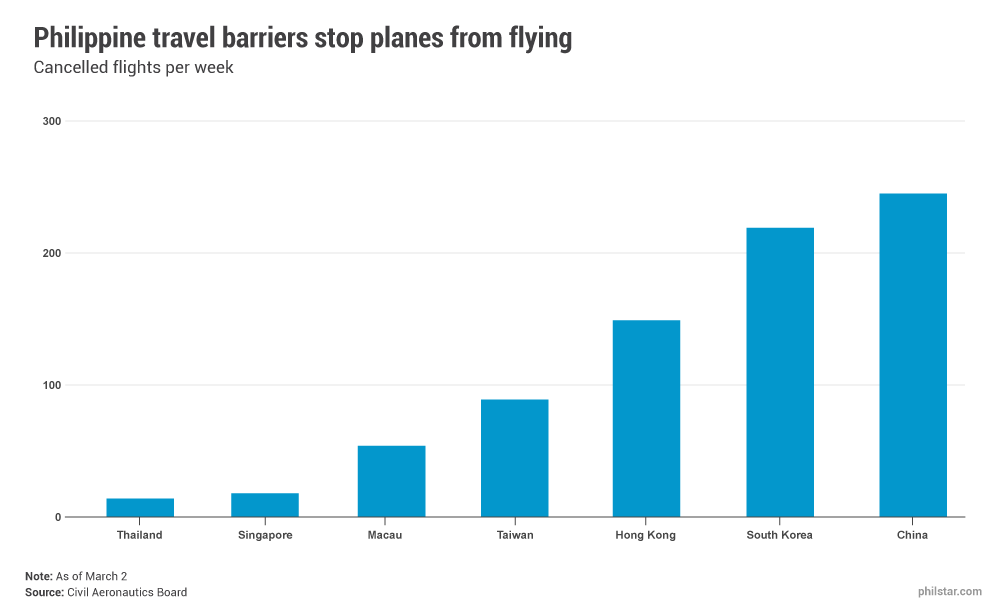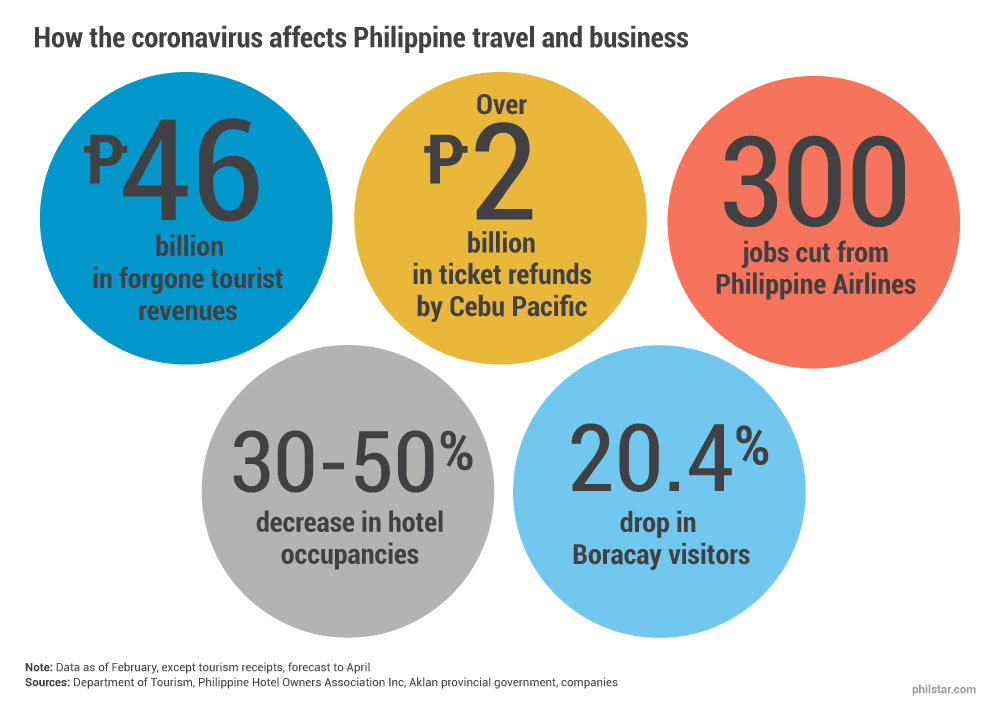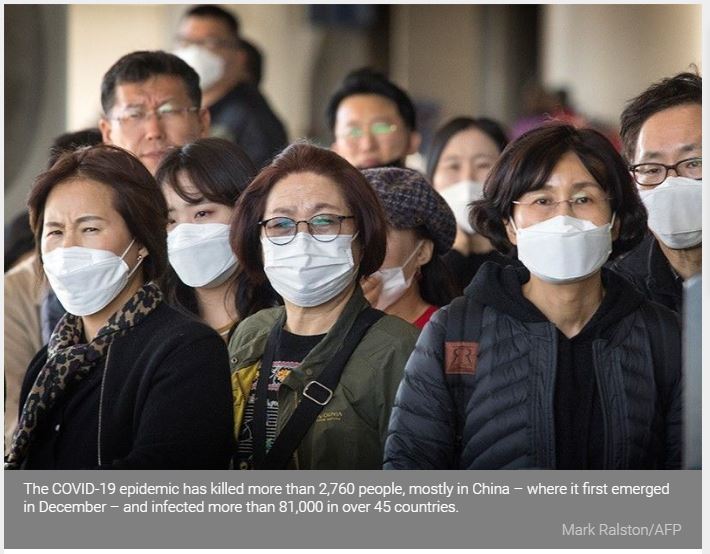Philippines: Tourism slowly feels impact of coronavirus
MANILA, Philippines— Despite the coronavirus outbreak, Pat Anthony Padua, a 24-year-old management trainee at a local bank, was all set to fly with friends to South Korea next week until the government spoiled the fun few minutes after he secured his visa.
“On February 26, our visa applications were approved only for the travel ban to be announced a few minutes later. Heartbreaking,” he said in an interview.
Three days after on Tuesday, the government announced the lifting of the ban, but it was too late. Padua’s airline proceeded with refunding his and his friends’ tickets after cancelling the Manila-Incheon route. “It’s time to make new plans,” he said.
Resigned to having a challenging year for the tourism industry this year, the Philippines is banking on people like Padua to look inward and travel locally. This is all to counter even partly, an expected dive in foreign visitors, a direct impact of government travel restrictions imposed against the country’s top sources of tourists to stop the coronavirus from spreading.
But the job is easier said than done, and with guests postponing vacations, the effect of coronavirus on tourism is slowly getting evident. Fewer tourists are taking holidays in key destinations, many accommodations are running empty, while hotel staff are being asked to cut work hours. At the extreme, cost-cutting measures meant people losing jobs.
Airlines
Taking the brunt of the impact are the airlines. The International Air Transport Association had earlier warned global aviation stands to lose $29.3 billion this year due to postponed and cancelled travels amid the epidemic.
In the Philippines, a total of 788 flights— equivalent to 173,297 seats— were grounded as of Monday, data from the Civil Aeronautics Board showed. Cancelled flights were recorded not only in China, Hong Kong, Macau and South Korea, jurisdictions where travel restrictions are in effect, but also in Singapore and Thailand where planes are supposedly still free to fly in and out.

For budget-carrier Cebu Pacific Air, which had to suspend 272 flights a week as a result of the ban, trip cancellations came in costly.
“There were already over P2 billion worth of refund for China, Hong Kong and Macau alone,” said Charo Lagamon, corporate communications director at Cebu Pacific, said last Friday.
Even the bigger Philippine Airlines (PAL) is hurting. After trading hours last week, PAL announced it is letting go of “about 300” workers “in the wake of losses sustained in 2019, aggravated by the ongoing travel restrictions and flight suspensions.” PAL suffered a net loss of P10.6 billion last year.
Broken down, “around 100” people underwent voluntary separation from the company which entitled them to benefits, while “about 200” were retrenched as part of “business restructuring,” a PAL source told Philstar.com.
Hotels
Without frequent flyers, hotels are also losing their avid patrons. Industry-wide, Arthur Lopez, president of Philippine Hotel Owners Association, told Philstar.com the group’s members are “feeling a downslide in their occupancies ranging from 30-50%, depending on source markets.”
For Ayala-led Seda Hotels, which has 11 hotels nationwide, this means lower occupancies in “those properties with a larger foreign mix” located in the country’s “central business districts.” “Several initiatives covering both revenue and cost areas have been put in place,” the management said without going into specifics.
Robert Zozobrado, president of Pacific Asia Travel Association, a group of airlines, hotels and restaurants, said separately, the drop in hotel accommodations would be “more pronounced” in traditional tourist spots like Boracay.
Data from Aklan provincial government showed visitors to Boracay slumped 20.4% year-on-year to 270,904 for the first two months of 2020. In February alone, tourists on the island, which just recovered some lost visitors after its 2018 rehabilitation, dropped a larger 38.9% annually.

In another tourist destination, Puerto Princesa in Palawan, the tourism office said arrivals “were low” in January, without citing data. “Domestic tourism cannot completely offset our losses from our foreign markets,” Zozobrado said in a phone interview.
Despite dismal operations, Zozobrado said hotels are unlikely to let go of workers “as they would need people once all these things are over.” “I’ve heard of hotels who ask their staff to take days off. Definitely, business has been affected,” he said.
Travel tours
Another area losing clients due to COVID-19 fears are travel agencies. Richie Tuano, president of Philippine Travel Agencies Association, said “hundreds of groups” cancelled or postponed tours set up by local agencies.
Majority of clients of travel agencies are Chinese travelling in groups, especially after the government offered them visas upon arrival since 2017, so travel suspensions against China alone would have a devastating impact. Adding Macau and Hong Kong prohibitions, the ban would easily cost the government P42 billion in tourism revenues until April.
“With the addition of South Korea in the travel ban, incremental losses are estimated at P4 billion more,” Tuano said.
Tourism data released last Monday showed Koreans and Chinese tourists as biggest spenders among visitors last year, helping propel tourism revenues to a new “all-time high” of P482.15 billion. The target for the year is P661 billion, a record goal the government has so far decided to stick on.
As businesses count the fallout from COVID-19, Zozobrado said the government should work double-time in boosting local tourism, and cancelling events like the Panagbenga festival in Baguio as well as the nationwide mall sale spearheaded by the Tourism department is not helping.
“We should not stop the festivals, the events. I think the Department of Health and other agencies are doing a good job in stopping the spread of the virus. We can always take precaution when holding these events,” he said.
Tuano said prospects remain dim for the tourism sector this year. “How long this crisis will continue is uncertain and everyone just hope and pray that this will be over soon so we can start recovery measures,” he said.
Source: https://www.philstar.com/business/2020/03/04/1997877/tourism-slowly-feels-impact-coronavirus


 English
English




